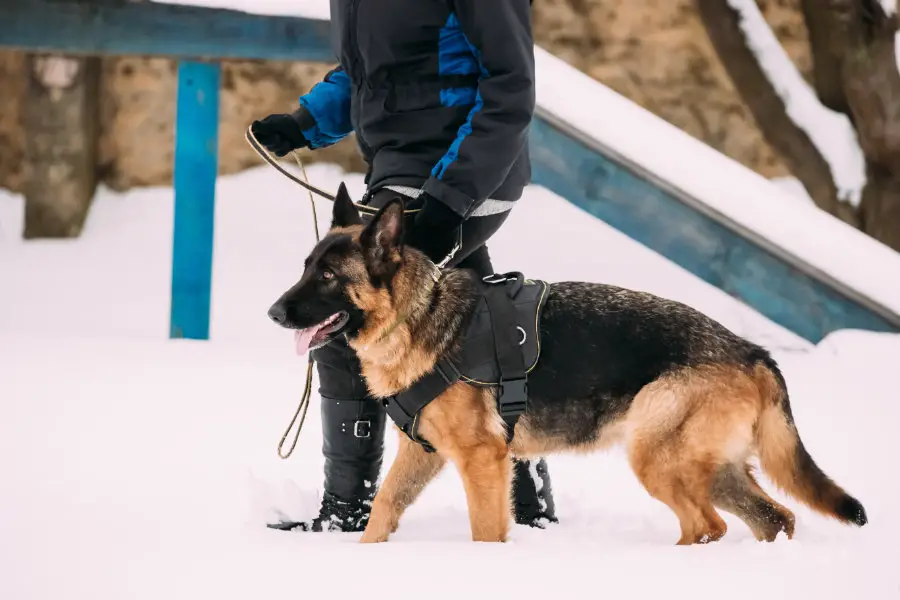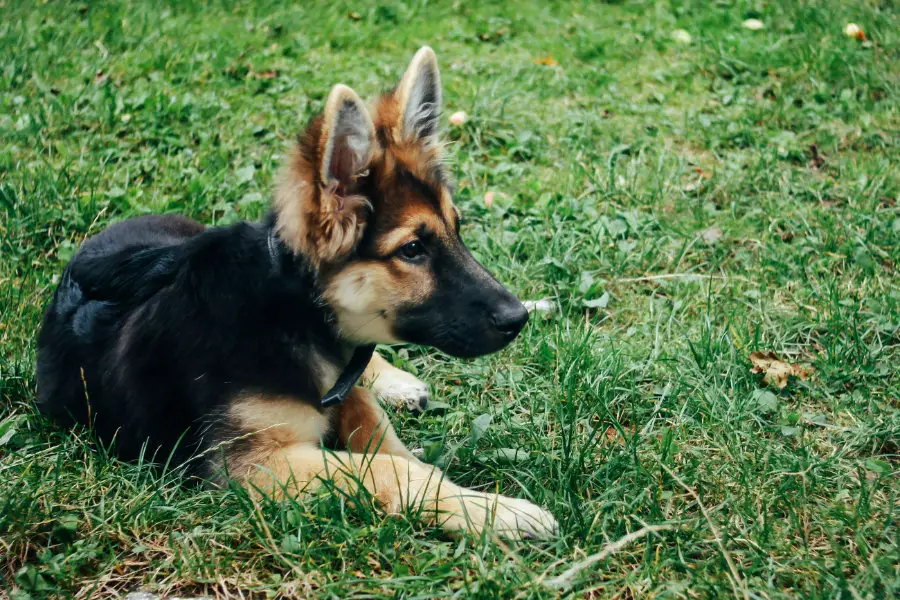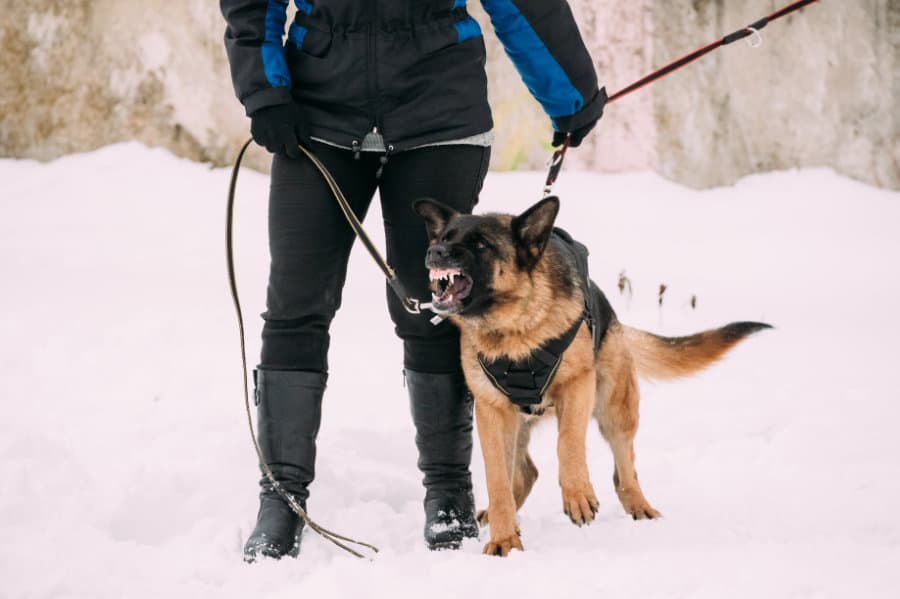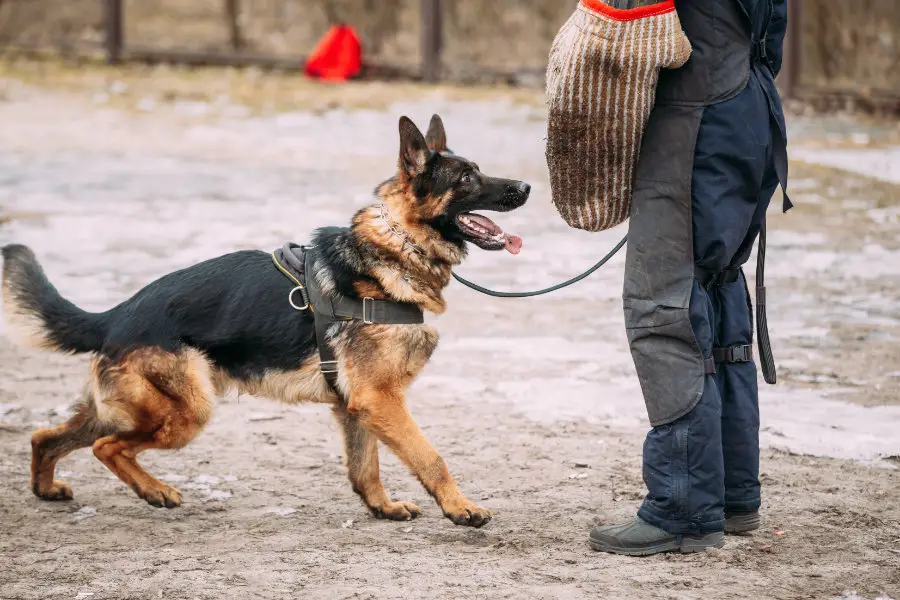If you want a dog that’s going to strike fear into the hearts of would-be intruders, chances are the German Shepherd is a breed that’s high on your list. A staple with police and people who want a dog that will warn away trespassers, the German Shepherd is a breed known for its intelligence and protective instincts. But are these protective instincts natural?
German Shepherds are naturally protective of their owners and familial units, intimidating potential threats when perceived. However, they may not physically protect their owners without extensive training. They need to be shown regular love and attention while being raised to manifest them.
If you’re looking for a great family dog that is also one of the most intimidating breeds on the market, the German Shepherd is probably right for you. Keep reading to find out all about this incredible breed of dog, as well as how you can help ensure that your dog protects you and your loved ones from potential threats.

German Shepherds And Their Natural Instincts
As a dog breed that’s been prized as a protective member of the family, German Shepherds have been trusted with flocks of livestock, kids, and families for centuries. There’s a reason for that; German Shepherds are among the most intelligent dog breeds and can learn and recognize commands very quickly.
German Shepherds will try to intimidate a potential threat, whether they perceive that as a threat to themselves or their owners. This generally manifests itself as barking and other aggressive behavior.
However, German Shepherds will not typically attack an intruder or potential threat unless that person is physically harming their family, or unless the dog has been specifically trained to recognize and attack potential threats. Of course, some individual dogs are more aggressive than others, so it depends on your dog.
Why You Might Want A Protective German Shepherd
At first, you may think it’s self-explanatory why you’d want your German Shepherd to be protective of you and your family. It could be one of the primary reasons you bought the dog, after all. However, there are great benefits if you go further than your dog’s instincts, and get it trained specifically to be a guard dog.
Your Dog Can Warn You Of Intruders
One of the key components of training a German Shepherd to specifically be a guard dog is to help keep you aware of who’s at your door, including potential intruders. In this day and age of smart video doorbells and motion-sensing cameras that feed directly to your phone, a good old-fashioned guard dog still has something to offer.
Potential ill-doers will probably know about smart doorbells and smart cameras, but they’ll still be wary if they hear a big dog barking behind the door. There’s no way to know what a dog is trained to do, and even if you know how they’ve been trained, a dog can still be unpredictable.
Natural Intruder Deterrent
With their fierce appearance, a German Shepherd is one of the best guard dogs available. Coupled with their large size and their exceptional intelligence, they understandably give an intruder pause, and they might just move on to the next house as a result. While you might not train your dog to be protective, the unknown still makes them a good deterrent.
Gentle With Family
As we’ll discuss more below, your German Shepherd, when trained and socialized correctly, can be a very gentle family dog who’s great with kids and is a great animal companion. Few dogs are capable of the behavioral “extremes” that a German Shepherd is; it can be a ferocious guard dog, but it can also be a loving family dog at the same time.
If you have young children, a German Shepherd can give you some peace of mind that your kids will be safe if they’re playing outside, or even in the house. The internet abounds with stories of German Shepherds saving small children from dangerous animals or people.
German Shepherds As Family Pets
Many people see German Shepherds as an ideal family pet because of their unique blend of high intelligence, protectiveness and playfulness with their family members. They’re surprisingly gentle with kids for such a large dog, but to make sure they’re good family dogs, they need to be extensively trained and socialized.

Families With Young Children
Families with very young children need to note that German Shepherds are a large dog breed, with the largest weighing in at 100 pounds. This means that, even if they are gentle around kids, they can be a handful and their weight can make them a risk for small kids. Keep that in mind if you end up going with a German Shepherd, and make sure they’re trained.
With that being said, German Shepherds can be surprisingly gentle for such a large, energetic animal. Many families have found that they can be one of the best family pets because of how well they get along with kids. However, one important thing to note is that German Shepherds sometimes have issues in multiple-pet homes, so keep that in mind, especially cats.
If you’ve already got a German Shepherd and introduce a new child into the family, the dog will likely see it as something to be protected and nurtured, just like a new puppy. Of course, your dog may struggle with feelings of jealousy with a new baby. To overcome this, it’s good to take steps to prepare your dog for a new baby. (You may read more about German Shepherds getting along with a newborn)
Protection Vs. Guarding
You’ll probably come across the terms “protecting” and “guarding” in your research into German Shepherd behaviors and training, and many times, these two terms are used interchangeably. They’re not entirely the same, and it’s important to know the difference so you know what you want to train your dog to be and do.
Protection
A dog that’s trained for protection will attack an intruder, but only on command. They’re held to a higher standard of training and discipline, and they obey their owners’ commands. They’ll bite only when necessary, but when they do, you’ll know that they mean business. A good example of a protection dog is one that’s trained for military or police applications.
A protective German Shepherd is one that’s always prepared, always alert, and always ready to heed your command. Think about the German Shepherds you might see on a K-9 unit; they only attack when commanded to, but when they do, they’re extremely dangerous, and they stop as soon as they’re told to.
Guard
A guard dog, by contrast, is what you’ll probably have as a homeowner. A family dog can be trained to be a guard dog with relative ease, especially German Shepherds with their instincts. Guard dogs are well trained and obey commands, but they’re typically trained to guard a specific place (like your house).
German Shepherds naturally lend themselves to being guard dogs and protective dogs because of their high level of intelligence, ability to be trained and obey commands, and their natural protective instincts. Either is a good option, but you should know that protection dogs receive much more disciplined training to do their job effectively.
Training Your German Shepherd To Be More Protective
Even though German Shepherds naturally display protective behaviors towards their families, you may or may not be certain if they’ll intervene if you’re in actual physical danger. If that’s the case, you’ll probably need to enlist the help of a professional trainer.
If you want to train your dog to protect you and your family, it’s best to start when the dog is young. The important thing to remember is that you want to train your dog to be protective and confident, not aggressive. Your dog is also not learning how to attack, but rather to protect, guard, and immobilize.
Since German Shepherds are naturally protective, it’s usually unnecessary to train the dog to be protective. It already has those instincts. Rather, training is intended to help the dog learn to identify friends from threats. Otherwise, it might feel the need to intervene when your child’s friend is over at your house playing together.

When You Might Want Your Dog to Protect You
There are a variety of circumstances in which you might want your German Shepherd to protect you. To get this to happen, you’ll have to train your dog to protect you, not just bark at a threat. These scenarios might include:
- Outdoor threats (animals, humans, etc.)
- Home invasion scenarios (one or multiple intruders)
- Carjacking attempts (when your dog is with you in the car)
Each of these scenarios involves nuances when training your dog to be protective, because of the different environments and different potential threats in each scenario.
Steps In Training Your Dog To Be Protective
Training your German Shepherd is something you can do on your own. There are a few steps involved in this venture; these steps are outlined below:
Socialization
The first step is to introduce your puppy to a whole host of different social experiences to help them learn what normal human interaction entails. You’ll want to take them with you when you go places and let them meet and interact with different people daily. You also want to make sure you keep them in the house to get to know your family better.
German Shepherds aren’t outside dogs, and they need tons of attention to be happy and well-adjusted. Making sure they’re socialized well from a young age also involves letting them get to know your family. If your dog is treated well by your family and spends plenty of time with you and your kids, they’ll feel the bond of protectiveness much more strongly.
Obedience Classes
It’s important that your German Shepherd can obey commands, even if you’re not specifically training them to be a guard dog. However, if you want them to actively protect you on command, they must obey your commands better than the average dog. This step is something you could undertake on your own or find a good obedience school.
When you’re looking for an obedience school or dog trainer, you should keep the following things in mind:
- Interview a few trainers. Many times they have different philosophies. Look for one who uses positive reinforcement to create a bond with your dog.
- Determine the class schedule or if the trainer offers private training. Whichever you choose will likely be based on your budget and schedule.
- Ask trainers about credentials and the training they have.
- Look for a trainer that you feel comfortable around. You’re getting trained just like the dog when you both go to obedience classes.
All of these features should help you evaluate the various obedience classes available to you in your area. The key is to find a place where you’re comfortable, your dog is comfortable, and you like your trainer’s dog-training philosophy.
Encourage Your Dog To Bark At Visitors
You want to make sure your dog stays aware of when people are visiting your home, so training your dog to bark when someone rings the doorbell or parks in your driveway is a key step in teaching them to be a guard dog. Right away, it shows your dog that they are a key player in protecting the home and helps them tell you when someone is at the door.
You also want to teach your dog to bark and stop barking on command as part of this step. Your dog should bark when strangers arrive, but you don’t want them barking the entire time. Giving them a command like “Stop” or “Quiet” should make them stop barking immediately. Make sure you give treats when they bark at visitors and when they stop on command!
Teach Your Dog Where Its Territory Is
Finally, before you start teaching your dog to protect you and your family, you want to ensure it knows where its territory is. You don’t want your dog barking at strangers out on the street, but you need to teach it where its territory begins and ends, so it strengthens its protective nature. Dogs are naturally territorial, so this step is relatively easy.
Walking your dog around your property with a leash will help it realize where the territory begins and ends. You don’t want to let your dog bark at someone who’s outside your property. You also don’t want your dog chasing random strangers down the street, so you need to ensure your dog follows your directions on these walks strictly.

Schutzhund Training
While you’re researching how to make your German Shepherd into a good guard dog, you may come across a term called “Schutzhund”. When translated from German, this word means “protection dog”, and it’s part of a dog training philosophy that emphasizes turning dogs, particularly German Shepherds, into effective working dogs.
Schutzhund training includes many of the core tenets involved in training police and military dogs, and the version for civilian owners is similar. There are three pillars of training dogs in Schutzhund training; obedience, tracking, and protection. Each of these focuses on teaching the dog to be a productive and obedient member of the household.
German Shepherds are known for having a natural desire to work and stay busy, and Schutzhund training was specifically designed to capitalize on that desire. It also used to be used for training German Shepherds to be working dogs, assisting in keeping large herds of livestock together, and warding off predators.
Schutzhund is more than just a method of training, however, it’s a fun sport for dog owners to participate in with their dogs. Schutzhund trials are a series of tests designed to evaluate dogs’ ability to track, their level of obedience, and their ability to protect their owners on command. Dogs that pass these trials are given IPO titles that show they are high quality.
What To Do If Your Dog Is Overly Protective
Like most things in life, it’s possible for your dog to take being protective too far and for it to become dangerous. Sometimes, dogs may be vicious towards your friends or people that aren’t an obvious threat, and in these cases, you need to intervene. Even if you don’t think your dog will bite someone, there’s no telling what the dog will do.
Dogs may develop this sort of behavior for various reasons, but most of it stems from some sort of unconscious training and reinforcement on the part of the owner or strangers. The key is to recognize this behavior when it first starts to show (i.e. when your dog starts growling at strangers) and stop it immediately. Good socialization helps with this.
Usually, dog aggression instead of protection stems from some level of insecurity and fear on the part of the dog, who overcompensates by growling, barking, snarling, or in the worst circumstances, biting. This is not the sort of behavior you’re looking for out of a guard dog. With a guard dog, the key is for you, the owner, to be in control of the dog’s behavior.
Identifying the dog’s behavior is the first step, but if you don’t catch it until it’s too late, you will need to find a good trainer specializing in handling overly aggressive dogs. Aggressive dogs are difficult to handle, so you’ll want an expert to help you get your dog back under control and obedient.
Does Spaying And Neutering Affect My Dog’s Protective Instincts?
Many people wonder whether fixing their dog (also referred to as gonadectomy) has any impact on the dog’s ability to be protective. If you’re adding a German Shepherd to your family as a guard dog, you probably don’t want to do anything to the dog that may remove its natural instincts to protect you, your family, and your home.
There’s some fairly well-established science that states that gonadectomy doesn’t have a significant effect on a dog’s level of aggression, with multiple studies indicating that no matter what age a dog is spayed or neutered, it won’t make it significantly more or less aggressive, except nominally more aggressive towards strangers.
But will it have an effect on your dog’s obedience? There’s also evidence that indicates that fixing your dog has a positive effect on some of its behavioral issues; dogs that are fixed will urinate less in the house, roam less, and mount people and things less frequently than dogs that aren’t fixed.
Dogs’ behaviors aren’t fundamentally changed by spaying or neutering; so it really won’t have much of an effect on their overall obedience. Since protectiveness and guarding behaviors are primarily a function of a dog’s obedience, you shouldn’t have an issue if you decide to fix your dog and then train it to be a guard dog.
Why A German Shepherd May Not Be Protective
You may find that your German Shepherd isn’t protective, though, and you likely wonder why that might be. You want your dog to be friendly but not too friendly. There are a number of reasons your dog may not be as protective as other dogs of its breed, and here are some of them. We’ll go through them in a little more detail below.
- Improper training
- Diet
- Excessive Socializing
- Anxiety
Improper Training
Although your dog has natural protective instincts with its family, these protective instincts need to be honed through the proper training. On the one hand, your dog may lose its protective instincts and become too friendly to be a good guard dog, while on the other, without proper training, it may become overly aggressive and bark at everyone who comes around.
Your German Shepherd needs intensive training to properly develop into a guard dog, whether that’s through Schutzhund training or a similar program. He/she needs to be trained to recognize a threat from a benign stimulus, and especially, needs to be trained not to attack, but to defend and listen to commands.
Diet
Another item you might not necessarily consider is your dog’s diet. A dog with an improper diet or who doesn’t get enough exercise may not have the energy to be protective. If your dog is obese or easily fatigued, make sure it’s getting the proper nutrition. Behavior is closely tied to a good diet, so be sure to rule this out if your dog isn’t as protective as you’d expect it to be.
Excessive Socializing
Closely tied to improper training is excessive socializing. If your dog is too friendly with strangers, you may be worried that it won’t protect you if there’s a legitimate threat to you and your family. Your fears aren’t entirely baseless in this case. Many dogs run and hide when their owners are attacked because they received excessive socialization.
While socialization is important to make sure your dog is well-adjusted and doesn’t get too aggressive, too much socialization can make it overly friendly. Excessive socialization can be overcome by getting your dog involved in an intensive guard dog training program and use some of the tips from earlier in the article to help it develop protective behaviors.
Anxiety
While German Shepherds are great guard dogs and wonderful family pets, they’re also very anxious dogs who can experience behavioral issues when they’re away from their human owners. This is one of the reasons why your German Shepherd shouldn’t be chained up or left outside; they don’t do well on their own.
You also can’t leave them alone for too long throughout the day, or your dog will most likely develop anxiety. German Shepherds are herd and pack dogs who are most at ease when they’re around their families, so dogs who are anxious because of absence may develop behavioral problems.
Anxiety could make your dog less protective or more protective; it really depends on a variety of other factors, not least of which is your individual dog’s temperament. Luckily, it’s possible to train your dog and work with it to overcome its separation anxiety and learn how to be protective of you and your family.
Your German Shepherd was specifically bred to be protective and to guard its family and territory, so you should rest assured that your dog will naturally protect you and your family. While it does have natural protective tendencies, it won’t do it correctly if you don’t give it the training it needs.
If you’re thinking about getting a German Shepherd as a guard dog, or if you want to try and train your dog to be more protective, remember your dog’s protective instincts need to be properly honed and controlled so it doesn’t get out of hand and get too aggressive and dangerous.
